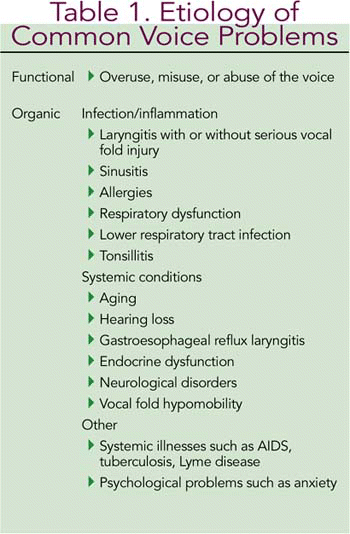Voice problems in professional voice users are largely the same as those that occur in the general population, but with one important caveat-the potential consequences. Many nonprofessional voice users have the same vocal problems as voice professionals, but the consequences of such problems are different, said Robert T. Sataloff, MD, Professor and Chair of Otolaryngology-Head and Neck Surgery at Drexel University College of Medicine in Philadelphia. An industrial shop foreman who has very mild hoarseness or loses one or two notes at the top of his range is likely to have his personal and professional life unaffected. A singer with the same symptoms may be totally disabled.
Explore This Issue
June 2007As one of the most prolific writers on caring for the professional voice, and as an otolaryngologist who sees many professional voice users in his practice, Dr. Sataloff emphasizes the challenges faced by otolaryngologists who care for professional voice users. The definition of ‘normal’ is more narrow than the definition we usually enjoy in general otolaryngeal practice, he said, adding that professional voice users, such as singers, demand and require physiologic perfection, not just a functioning voice with a normal range like the rest of us. This difference-the consequence of vocal problems for the professional voice user-has driven the need for special training and a team approach to diagnosing and treating vocal problems in the professional voice user.
Common Voice Problems
Vocal problems commonly seen among professional voice users can be divided into two etiological categories: functional and organic. Functional problems include voice use issues-overuse, abuse, or misuse of the voice. Organic problems refer to physiologic changes brought on by environmental exposure (such as allergies), alterations in hormones, or other systemic conditions that can adversely affect the voice, such as gastroesophageal reflux disease, acute infectious laryngitis, and benign vocal fold masses. Table 1 lists the etiology of common disorders.
Some data suggest that the majority of voice disorders are caused by functional misuse of the voice or to psychogenic factors resulting from a voice that is not working properly, with the minority of patients experiencing organic causes of voice problems. According to Peak Woo, MD, of the Grabscheid Voice Center at Mount Sinai Medical Center in New York, heavy voice use is the cause of some of the most common vocal problems. There are certain lesions and patterns associated with voice abuse, he said. Common ones are vocal nodules, vocal polyps, and laryngeal granulomas. Other problems that cause voice dysfunction include vocal cysts, Reinke’s edema, vocal scars, vocal fold hemorrhage, laryngeal papillomas, and cancer.

Leave a Reply